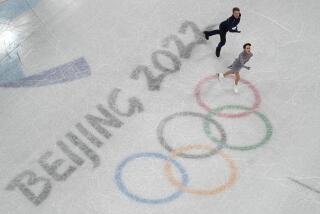WINTER OLYMPICS : Scoring Dispute Erupts in Pairs’ Figure Skating
- Share via
CALGARY, Canada — Everyone knew it would happen sooner or later, so why not sooner? Figure skating competition at the Winter Olympics was barely one hour old before it had its first East-West judging dispute.
It did not affect the leaders. The Soviet Union’s incomparable pairs team of Ekaterina Gordeeva and Sergei Grinkov were supposed to win here easily, and the two-time world champions easily were the best in Sunday night’s short program, which counts for 28% of the final score. Their anticipated coronation will occur following Tuesday night’s long program.
But the questionable judging did determine the second and third place teams. Either eight of the nine judges over-scored Jill Watson and Peter Oppegard of the United States, or one judge, East German Guenther Teichman, underscored them. Draw your own conclusions. The crowd at the Corral went with the majority, booing the East German’s mark when it was announced in English and then again when it was announced in French.
According to four of the nine judges, Watson, of Bloomington, Ind., and Watson, of Knoxville, Tenn., performed the second-best program. But the East German, giving them a 5.2 out of a possible 6.0 for required elements, had them 7th of 15 pairs. If Teichman’s scores had been in line with those of the other judges, the Americans would be in second place.
Instead, they are third, just behind another Soviet pair, defending Olympic champions Elena Valova and Oleg Vasiliev, and just ahead of another U.S. pair, Gillian Wachsman of Greenwich, Conn. and Todd Waggoner of Schaumberg, Ill. The third American pair, Natalie and Wayne Seybold of Marion, Ind., is 10th.
Both Watson and Oppegard, who represent the Los Angeles Figure Skating Club, said they are comfortable with third place. They should be since it is the same place they were after the short program at the 1987 world championships in Cincinnati, where they also trailed the two Soviet pairs. The standings did not change after the long program.
Oppegard said he believes they can improve their position in the long program this time.
“There’s no reason for playing conservatively at the Olympic championships,” he said. “We’re pleased we came so close to finishing second (in the short program). But we like this position, knowing we’ll be challenging.”
As for the East German’s assessment of their program, Oppegard and Watson used the same word, puzzling.
“I don’t know what could have been the reason for it,” Watson said. “Maybe he thought something happened that didn’t.”
The U.S. judge, Claire Ferguson, said that judges discussed last week whether one of Watson’s moves fulfills a requirement for the short program. Apparently, she said, all of them decided that it did except for Teichman.
“That’s the sport of skating,” Watson said. “I felt it was our best performance of the whole year, but judges have their own opinions. It helped that the crowd was so supportive. That made us less tense. We’re still in a very good position. “
Gordeeva and Grinkov seem to own their position. They won the world junior championship in 1985, then knocked off the defending senior champions, Valova and Vasiliev, in the 1986 world championships and defended their title last year in Cincinnati.
Only 16, Gordeeva lists collecting dolls as one of her hobbies, and she is barely larger than some of them at 5-1, 90 pounds. Her partner, Grinkov, 21, is 6-0, 170 pounds. He throws her into the air as if she were a feather.
Valova and Vasiliev won the Olympic gold medal in 1984 and were world champions in 1984 and 1985. Since then, they have had to be satisfied with second place even in their own country. It appeared as if they might not be in Calgary when they missed last month’s European championships because of Valova’s foot injury. But she appears healthy now.
More to Read
Go beyond the scoreboard
Get the latest on L.A.'s teams in the daily Sports Report newsletter.
You may occasionally receive promotional content from the Los Angeles Times.






